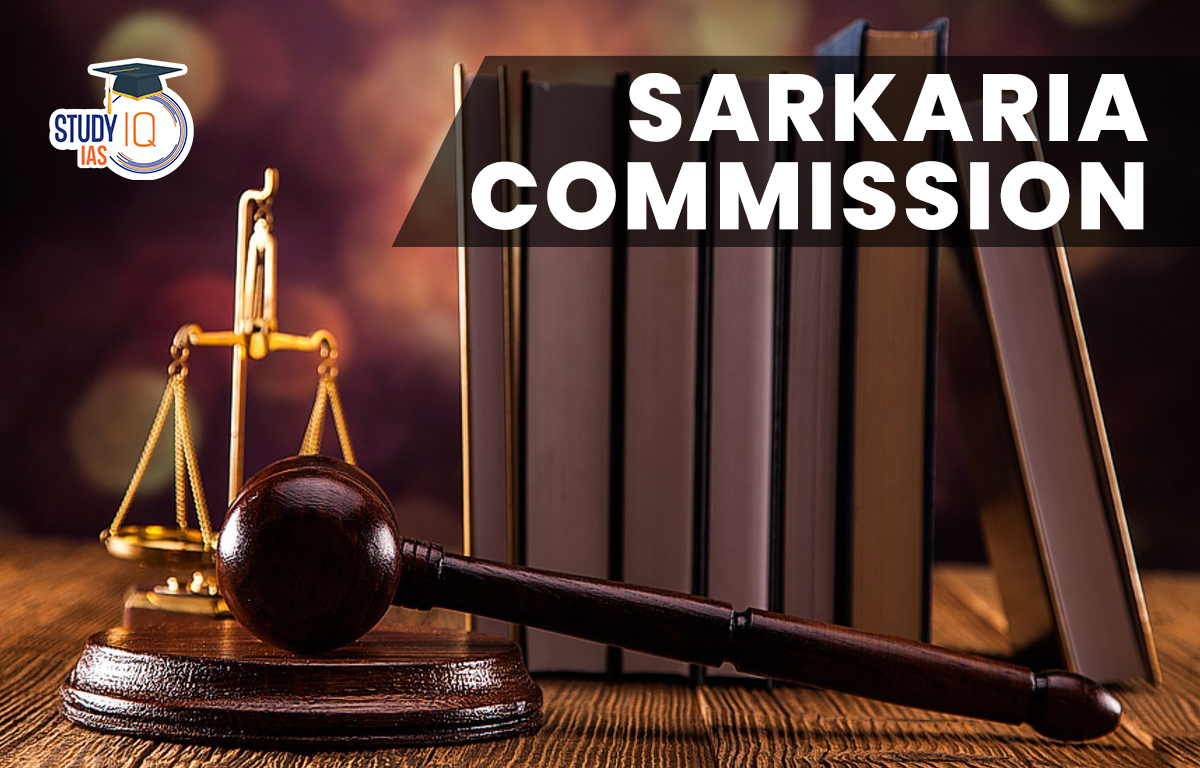Table of Contents
In 1983, the Indian government set up the Sarkaria Commission to study various constitutional issues, focusing on the relationship between state and central governments. One main recommendation was to create an inter-state council, as mentioned in Article 263. The Sarkaria Commission is covered under the Indian Polity and Governance section of the UPSC Syllabus. Students can also go for UPSC Mock Test to get more accuracy in their preparation.
Sarkaria Commission History and Background
The central government created the Sarkaria Commission to improve state-center relations. Given a year to work, its term was extended four times, and it submitted its report in 1988. It recommended that politicians from ruling parties can not be governors. Instead, governors should be nominated after consulting the state’s chief minister and should have a strong, respected background without political ties. The Commission also suggested that clear reasons should be given when firing government employees. For choosing the chief minister, any party with strong legislative support should be allowed to form the government.
Background
The Sarkaria Commission, formed by the Ministry of Home Affairs on June 9, 1983, under R.S. Sarkaria, B. Sivaraman, and S.R. Sen, aimed to enhance economic and social development through constitutional frameworks. It focused on maintaining India’s independence, integrity, and unity while promoting welfare. The commission reviewed the roles of state and center in project planning and implementation, making recommendations. The government adopted 180 of these recommendations, which were implemented in 1990 by the internal state council
Also Read: Amendment of the Constitution of India
Sarkaria Commission Objective
In response to the drive for State autonomy, the Central Government established the Sarkaria Commission to offer suggestions regarding the Centre-State relationship. The Commission submitted its final report in 1988. The Indian Constitution’s authors placed a high priority on maintaining the integrity and unity of the country. They were aware of the factors contributing to the nation’s unrest and instability. At the period of independence, only a strong central authority could fend against these dangers.
The Administrative Reforms Commission and other Commissions were established by the Indian government to manage relations between the Centre and the States. The Union Government created the Sarkaria Commission to offer suggestions for ways to improve Centre-State relations. In 1983, the Sarkaria Commission was set up in response to demands for more autonomy. Its goal was to evaluate all present contracts between the Centres and the States and suggest any required changes or measures.
Sarkaria Commission Report
The commission’s report has two parts: the main report and memoranda from state governments and political parties. It covers inter-governmental relations in legislation and administration. The report suggests creating a permanent Inter-State Council under Article 263 to improve coordination. It includes 247 recommendations across 19 chapters.
Also Read: Delimitation Commission
Sarkaria Commission Feature
The following are the features of the Sarkaria Commission:
- The Sarkaria Commission submitted its report to Prime Minister Rajiv Gandhi in October 1987.
- The report includes 247 recommendations, divided into 19 chapters.
- It details the relationship between states and the center.
- The report is not mandatory, but courts have used its recommendations.
- It discusses the use of Article 356 and the Governor’s role in legislation.
- It highlights the benefits of Article 252 and limits the power of the Indian government.
- It suggests forming a stable council in all states under Article 263 to investigate and advise on state disputes.
Sarkaria Commission Recommendations
The following are the important Recommendations of the Sarkaria Commission:
- Appointment: Select individuals with extensive public service experience and non-partisan attitudes.
- Empower States: Allow states to develop and implement welfare schemes independently.
- Cooperative Federalism: Federalism should promote cooperative action, not just be a static concept.
- Financial Resources: Ensure states have sufficient funds to reduce reliance on the central government.
- Inter-State Council: Establish a permanent council to resolve disputes between states.
- All-India Services: Empower these services for better administration.
- State Bills: Inform states when their bills are vetoed by the President.
- Armed Forces Deployment: Consult with states before deploying armed forces.
- Residuary Powers: Parliament retains powers to make laws on taxation; other areas fall under the concurrent list.
- Article 356: Apply President’s rule only as a last resort in extreme situations.
Governor Appointment Recommendations:
- Consult the Chief Minister, Vice-President, and Lok Sabha Speaker.
- Involve state governments in forming panels for governor appointments.
- Allow governors to complete a five-year term.
- Appoint eminent individuals from outside the state.
- Post-retirement, governors should not hold any other government office and receive benefits.
Case Study: Maharashtra
In 2019, Maharashtra’s governor revoked President’s rule to allow the Chief Minister’s oath when no party could form a government. This was criticized and declared unconstitutional.
Significance of the Sarkaria Commission:
- The Commission’s recommendations gain attention during political instability and disputes over the governor’s role.
- The Supreme Court has supported many recommendations, emphasizing their importance in maintaining harmony between the Centre and the States.
- Recent state tensions highlight the need to implement the Commission’s suggestions to reform the governor’s office and uphold federalism.
- The Sarkaria Commission report remains crucial for safeguarding India’s democratic principles.
Sarkaria Commission UPSC
The Sarkaria Commission supported the institutions’ current constitutional provisions and guiding principles and opposed structural changes. However, it concentrated on the requirement for operational or functional changes. It was emphasized that rather than being a fixed institutional idea, federalism is more of a practical structure for joint action. Students can read all the details related to UPSC by visiting the official website of StudyIQ UPSC Online Coaching.


 SLAPP Suits: Meaning, Examples, Impact o...
SLAPP Suits: Meaning, Examples, Impact o...
 Finance Commission of India, Articles an...
Finance Commission of India, Articles an...
 High Number of Pending Cases in Supreme ...
High Number of Pending Cases in Supreme ...

























